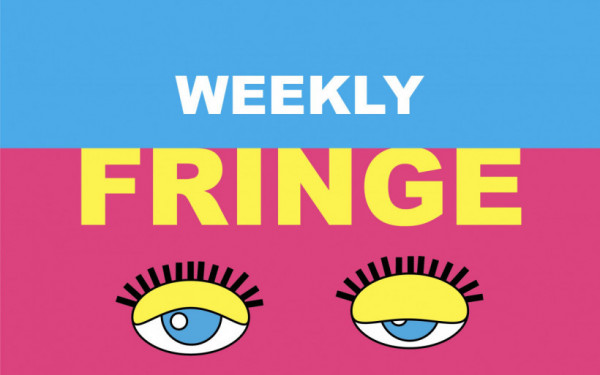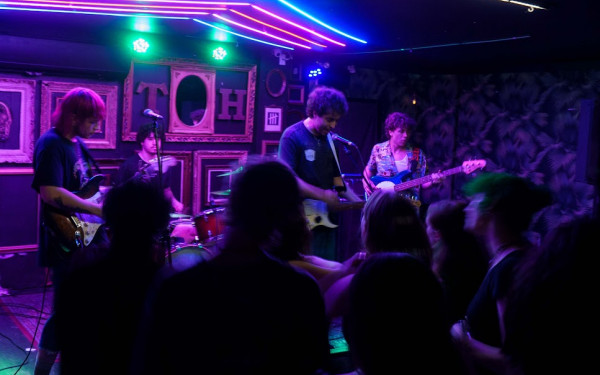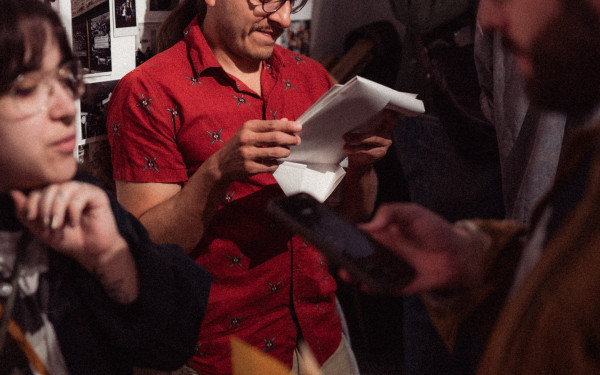Exploring the universe with Ruby Waters
The Canadian singer-songwriter gears up to burn the house down at Beanfield Theatre
Let’s set the scene: singer-songwriter Ruby Waters is playing a concert in Detroit, Michigan, USA. It’s a Friday night and she’s in a bar bathroom across the street from the venue. She’s taking a shit.
“These girls were in the stall next to me, and I guess they were coming to the show,” Waters recounted, affable as ever. “They were talking about what they wanted to hear that night and I heard one of them say, ‘I really hope she plays “Honey,”’ and the other girl’s like, ‘I don’t think she will.’”
“Honey,” a fan favourite off of Waters’s first EP, Almost Naked, wasn’t on the setlist for the night.
“But during the acoustic part [of the set], I told the crowd, ‘I was taking a shit and I heard one of you say you wanted to hear this song—I was in the bathroom, bitch!’” she said, laughing. “It’s things like that that are like, ‘Just do it.’ You’re lucky enough to have fans that want to hear it.”
In her music and in conversation, onstage and onscreen, Waters is often many things at once. Irreverent and bawdy, goofy as hell. Sexy and a little bit drunk. Broke in the pockets but rich in the mind, or sad and a lot drunk. However, there are three constants: she’s always dynamic, always grounded and always flush with gratitude.
“It’s pausing, breathing, counting your blessings,” Waters explained. “If you’re not thankful for what you got, you don’t fucking deserve it, in my opinion. I don’t know, I’ll just try to be thankful forever and maybe that jadedness will never come.”
“Oh man, she’s the best person you’ll ever meet,” said Waters’s guitarist Marcus Ramsay, describing her disposition.
Ramsay, a sought-after multi-instrumentalist, producer and songwriter, met Waters in 2020 through mutual friends. He started to record with Waters and her longtime producer Sam Jackson Willows the following year, and he joined her live band in 2022 as they returned to the road post-pandemic.
“It’s inspiring. She’s one of the most true-to-her-craft artists I’ve had the opportunity to work with,” Ramsay said. “There’s no shortage of good times when Ruby’s around. She can make any situation into a fun situation.”
Waters’s music is a full body exercise swirling around one immovable fact—she has a voice like a bursting dam. It's deep and fluid, sedimented with rushing history. It can pick up the shrapnel of an afterparty and press it into poetry.
Waters released her debut album What’s The Point at the end of May. The 10-song collection, ripe with those impellent vocals and reflexive writing, was largely recorded over seven days in the pillow-fort sound booths of a secluded British Columbia cabin.
“It was like, what you hear about in the fucking movies or back in the day when bands used to trap themselves trying to write their album,” Waters said. “There’s a bunch of producers and me. So, a little different. But still, that was trying to capture that feeling of cabin fever and see what comes out of it.”
Many of the records’ seeds were planted beforehand in ideas Waters or her producers brought to the table.
“They’re all really talented people and everyone’s ideas kind of got infused into the record,” she explained. “We worked long and hard, but quick at the same time. We didn’t lose that soul or feeling or emotion.”
Waters’s international What’s The Point Tour will culminate on Nov. 21 with a show at Montreal’s Beanfield Theatre. Bring earplugs—a Ruby Waters concert is just about the opposite of the silent films the theatre was originally built to show.
"I personally take a lot of pride in it feeling like a real rock and roll band—two guitars, drums, bass,” Ramsay said. “I think in an age of a lot of performances that come across exactly like the record, it’s often new interpretations that we play live. There are a lot of sections of the show that can be improvised and changed from night to night, and it keeps us on our toes.”
Logan Kearns, co-founder of Camp Music Management, has been working with Waters since late 2017. He calls her development as a live performer one of her biggest markers of artistic growth.
“Her live show has gone from her and an iPod, pushing play for the music, to a four-piece band and touring crew and a touring bus,” Kearns said. “You know, working with her when we were doing 200-person venues to growing this thing to the point where she’s selling out Danforth [Music Hall] and Commodore [Ballroom], all these 1000-plus cap venues? The Troubadour in L.A. and Music Hall [of] Williamsburg in New York—these are iconic venues, and to see her up there headlining and owning the room has been incredible.”
Even as the venues have grown and her name has moved up the billing, Waters’s backstage attitude has stuck around.
“I get the same nerves every show and I try to sing my best every show,” Waters said. “That’s pretty much how it’s always been and I feel like how it’s always going to be.”
Nowadays, coping with those nerves looks like a couple fewer PBRs and less tequila on the rocks. More warmups.

“I hated even the idea of vocal warmups. I was like, ‘God! It’s so not rock and roll,’” Waters admitted. “In fact, it totally is, and it’ll help you sing for a long time.”
Moments of mindfulness have become part of her routine—taking the time to acknowledge and process what she’s feeling.
“My mom always said that if you’re nervous, it means that you care,” Waters explained. “So I always try to tap in and remind myself. Like I’m really fucking nervous: ‘It means I care. It means I care. It means I care. It’s going to be an awesome time.’”
Waters attributes the gravity she finds in many aspects of her life to where she comes from.
“There’s definitely a parallel universe where none of this shit ever went the way it went,” she mused. “I feel like I was raised good and we didn’t have a shit ton of stuff by any means; didn’t have a lot of money.”
Growing up in the dirt road country of Shelburne, Ontario and Chapeau, Quebec, Waters cut her teeth playing for pedestrians and bargoers. After years of bouncing back and forth between Toronto and British Columbia, she’s now settled in Whistler full-time.
“I bought a dirt bike this year; that was a ball out moment,” she said smiling, considering the ways in which the events of this universe have changed her life. “Bought a crazy booth at a strip club in L.A. recently. That was a ball out moment.”
As the tour winds down and Waters starts to plan for the future—maybe an album next year, maybe an EP or maybe even both, she said—there’s bound to be one more ball out moment, this one a show of gratitude.
“The last day of every tour, which is always the craziest show, you’ll find Ruby running around town putting together loot bags for everyone and little handwritten letters,” Kearns said. “She’s painfully Ruby.”
This article originally appeared in Volume 45, Issue 6, published November 19, 2024.






_600_375_90_s_c1.jpg)
